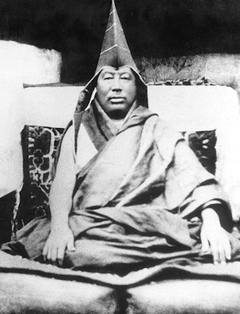Counsel of a Degenerate Dharma Pretender
Counsel of a Degenerate Dharma Pretender
by Khenpo Ngawang Palzang
E ho ho! I, a degenerate Dharma-pretender
Deceived by the eight delusions,[1]
Stand bewildered on enlightenment’s path,
Having lost interest in practicing the six perfections.
Precious father, please look on me with compassion.
As usual, your child has fallen into confusion.
I still only speculate about the Great Perfection teachings;
I’ve flung far away the profound practices of its path;
And I've been all too enamored with the appearances of this life.
Please, think lovingly of me, one who has made a mess of the path.[2]
Though I was born among the followers of the Omniscient One,[3]
Very little of my mindstream is in tune with the holy Dharma.
The more I think, the more my grief grows.
My sad heart's sorrow comes from deep inside.[4]
How I yearn to be over this life’s experiences.
How I yearn to banish the insidious demon of expecting everything to work out.[5]
Pretending to be good to gain renown—who does this help?
Please bless me to attune my mind to Dharma.
Father, please hold me in your wise and compassionate heart,[6]
For your child is in such a pathetic state.[7]
I wonder if I will ever make it to a place of solitude.
How I long to break the chain of being surrounded by students.
My superficial take on the Dharma is a grand misunderstanding.
This musty monastery is a demonic trap, I know,[8]
And everything I’ve done has only added to saṃsāra!
Guru, please think of me; let your child's wishes come true.
I'm counting on you to dissolve my obstacles!
I beg you for whatever it takes to gain unhindered accomplishment.
May goodness spread fast, like a fleet-footed deer.[9]
| Translated by Joseph McClellan with editorial assistance from Ninjyed N.T. and with clarification from Dubseng Rinpoche, 2024.
Bibliography
mKhan po ngag dgaʼ. gSung 'bum ngag dbang dpal bzang, vol. 2, pp. 39–40. Khreng tuʼu, n.d. BDRC W22946.
mKhan po ngag dgaʼ. gSung 'bum kun mkhyen ngag gi dbang po, vol. 1, p. 182. sNga ʼgyur kaḥ thog bcu phrag rig mdzod chen moʼi dpe tshogs. Khreng tuʼu: Si khron mi rigs dpe skrun khang, 2017. BDRC W4CZ364088.
Version: 1.1-20240625
-
“Eight delusions” here stands for the “eight worldly concerns,” the false paths of basing one’s happiness on gain and loss, feeling good and not good, praise and censure, and recognition and insignificance. In verse, we find “the eight worldly concerns” to have too many syllables to fit into a felicitous line. We therefore go with “eight delusions” in the sense that we are delusional to think that those eight priorities will yield anything but more suffering. (Note that in the Tibetan we have amended the genitive kyi to the instrumental kyis). ↩
-
"Me, one who has made a mess of the path" renders lam log pa nga—lit., "wrong-path me." ↩
-
"Omniscient One" (kun mkhyen) usually refers to Longchen Rabjam in Nyingma contexts, though it can also cover Buddha Śākyamuni or other enlightened figures. ↩
-
This highly emotive line contains the elements "mind+sad+heart-wind+depth+from+rises." Here, mind (sems) can be rendered as "heart," since the Tibetan term contains these overlapping connotations. "Sorrow" renders snying rlung ("heart wind"), which connotes despondency or depression. The verb in the 2017 edition is langs (past tense), in the older, undated edition, it is lang (present/future tense). ↩
-
"Expecting everything to work out" renders bzang 'dod (lit., "good wanting"). "Insidious demon" renders 'gong po (lit., "gongpo spirit"—a class of negative spirit connected with one's innate aggression.) ↩
-
"Hold me in your wise and compassionate heart" renders the elements "compassionate+wisdom-mind+do." It might literally be thought of as "focus your compassionate enlightened mind (dgongs pa) [on me]." ↩
-
The older, undated edition reads tul ba'i snang tshul, which could mean "laughable condition." The 2017 edition, however, reads rtul ba'i, meaning weak or feeble, for which we use "pathetic." ↩
-
“Musty” here loosely translates gog po (“dilapidated”). Khenpo Ngawang Palzang was the head khenpo of Katok Monastery from 1909 to 1922. In his autobiography, he says openly that he remained there only at the command of his teacher and in service to the lineage but that he would have preferred to practice in seclusion. (Note that the available editions read zhags pa shes, though we believe zhags par shes is more grammatically correct since it clarifies the intention of the verb with an accusative particle.) ↩
-
"Like a fleet-footed deer" renders the more figurative ri shwa rlung khyer bzhin du—lit., "like a deer carried on the wind." ↩
